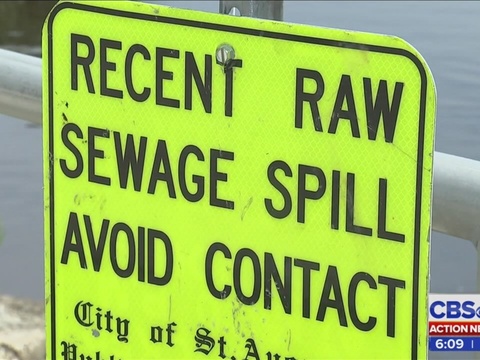Updated to reflect fact root cause analysis cannot be done in your head, JOHN.
JOHN PATRICK REGAN, P.E.
(HCN)
In 2008, then Assistant City Manager JOHN PATRICK REGAN, P.E., an environmental engineer, went to the podium at City Commission, insulting Judith Seraphin and I for reporting the City's sewage spills to our National Response Center, saying it was an abuse and not what NRC was intended for -- he LIED. He was so WRONG!
REGAN became City Manager in 2010, and sewage spills continue. Undeterred by the Minister of Propaganda and his nattering nabobs of negativism, I've continued to report sewage spills, with consequences.
Now the City has been fined (again) and actually required to use data to stop spills. How cool is that?!
Our City needs to encourage whistle blowing, not discourage it.
REGAN must never again try to chill, coerce and intimidate protected activity.
And, NO, JOHN, you can't do "root cause analysis" in your head, as you falsely claimed at st. Paul A.M.E. Church January 10, 2008 (concerning illegal dumping of a landfill in a lake, our Old City Reservoir).
Posted November 24, 2016 12:01 am
By SHELDON GARDNER sheldon.gardner@staugustine.com
St. Augustine plans to look at historical trends in spill data as part of agreement with environmental agency
CHRISTINA.KELSO@STAUGUSTINE.COM City of St. Augustine sewer Pump Station 64 at 301 East Marina Cove Drive on Anastasia Island, Tuesday, November 22, 2016. On July 15, 2016, a control failure caused the pump station to spill 18,000 gallons of contaminated water into the Matanzas River and a nearby retention pond.
CHRISTINA.KELSO@STAUGUSTINE.COM Pipes flow water into a retention pond adjacent to City of St. Augustine sewer Pump Station 64 at 301 East Marina Cove Drive on Anastasia Island, Tuesday, November 22, 2016. On July 15, 2016, a control failure caused the pump station to spill 18,000 gallons of contaminated water into the pond and the Matanzas River.
The city of St. Augustine plans to implement a more in-depth review process for sewer spills and new training processes for employees in 2017, including looking at trends related to past spills.
“I think it makes us just a little bit more accountable,” said Todd Grant, deputy director of public works.
The city recently sent a corrective action plan to the Florida Department of Environmental Protection as part of an agreement on how to address 18 sanitary sewer spills and overflows that happened in the city from July 2015 to February, and help prevent others. The FDEP had not yet approved the corrective action plan as of Tuesday.
The largest spill during the time frame was on East Marina Cove Drive, an 18,000-gallon spill in July that affected a retention pond and the Matanzas River, according to a city document.
Two of the projects are geared at helping focus on upgrading the city’s employee training, and a third focuses on investigating sewer spills. While the investigating committee hasn’t been formed yet, Grant said the city will be looking at spill history.
“We’re going to plot all of our sanitary sewer overflows, and based on that map if you have numerous dots in one location, that’s an area to go ahead and study and investigate further,” Grant said.
The spill data stretches back at least to 2008, he said.
The city had already announced in August plans to create the committee, but recently laid out their schedule for how they plan to do it.
As it stands the city already takes corrective action and evaluates every sanitary sewer overflow that happens in the city, but there’s no formal review meeting, according to the city.
That’s where the “Root Cause Committee” would come in “to evaluate the actual root cause of each sanitary sewer overflow, discuss response efforts and ensure corrective actions are taken to minimize the likelihood of recurrence,” according to the plan.
The city plans to build the root cause committee by the end of the year, create a spill investigation process for the committee, and then begin committee meetings in January.
The committee hasn’t been formalized yet. But Grant said he expects to serve on the committee alongside other city staff, including Public Works Director Martha Graham and engineer Reuben Franklin Jr.
As part of the corrective action plan, the city also plans to develop a library of written procedures for maintenance, inspection, safety and emergency operation and response. The city also wants to develop a formal tracking program for employee training, to “ensure employees receive proper training and identify additional training needs,” according to the plan.
Both of those are in addition to the regular training the city already does. Getting the training ready and implementing it will take at least until late 2017, according to the plan.
When the city’s agreement with FDEP on the 18 spills expires on Sept. 30, 2017, the committee will keep meeting, according to the plan.
Ed Jamro, subject matter expert in the field of wastewater for FDEP, said the agency could consider extending the deadline if necessary for the city to finish their work.
Russell Simpson, spokesman for FDEP’s northeast district, said the city has been “very proactive” in their work.
The spill agreement between the city and FDEP also outlines penalties for spills that happen in while the consent order is in effect, which it is until Sept. 30, 2017.
FDEP has not assessed penalties yet, and the city could see some, Jamro said.
If FDEP decided to issue a penalty, the city would plan on doing in-kind projects instead of writing a check, Grant said. The city has completed those before, including an educational program about not using the toilet as a trash can. The other one planned is an upgrade to the manhole covers in Davis Shores.
Some spills came during Hurricane Matthew, when about about 275,000 gallons flowed from the city’s sewer system into local waterways.







1 comment:
Yes it is cool! Kudos to the whistle blowers!
The city needs to rethink the entire water and wastewater system, possibly relocate some major components to higher elevations and spend more time on educating the public...
https://www.epa.gov/sites/production/files/2015-08/documents/flood_resilience_guide.pdf
Post a Comment